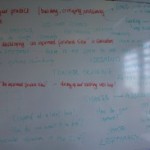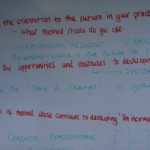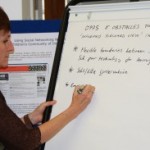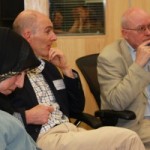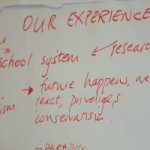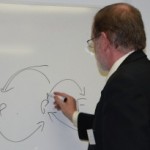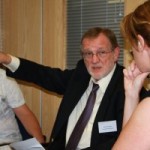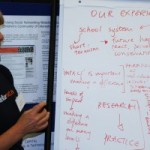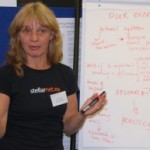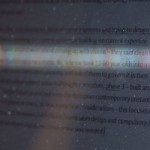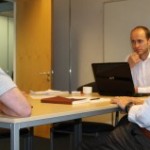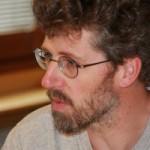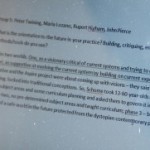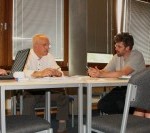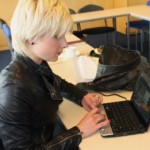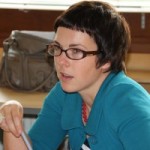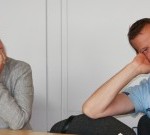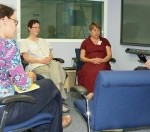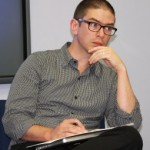events
12 April 2011, by admin
A one-day conference will be held at The Open University, Milton Keynes, on 17 May 2011 from 10.00 – 16.30 followed by a drinks reception and book launch.
Aimed at teachers, community educators, head teachers and other leaders and innovators involved in imagining futures-oriented provision, there will be a variety of workshops designed to explore what sorts of futures education may need to prepare for, what futures literacies might look like within learning and teaching, and what kinds of changes to education institutions might be needed.
The day will offer a range of keynotes and workshops designed to support educators and leaders explore and respond to potential change.
Confirmed contributors include:
-
Riel Miller, Xperidox Futures Consulting, Paris
-
Professor Guy Claxton, University of Winchester
-
Professor Anna Craft, The Open University and University of Exeter
-
Simon Mauger, Shoshin Ltd
-
Professor Mike Sharples, LSRI, Nottingham University
-
Professor Carey Jewitt, Institute of Education, London University
-
Professor Keri Facer, ESRI, Manchester Metropolitan University
-
Leena Llmola, International Institute for Applied Systems Analysis, Austria
-
Ginny Lunn, Prince’s Trust
-
Helen Beetham and Isabel Carlisle, Transition Network
The event will also see the launch of two books: Creativity and Education Futures: Learning in a Digital Age, Professor Anna Craft (Trentham) and Learning Futures: Education, Technology and Social Change, Professor Keri Facer (Routledge).
The conference is the final event in a series of ESRC sponsored seminars on the theme of educational futures run jointly by Manchester Metropolitan University, London Knowledge Lab, Nottingham LSRI, NIACE, Futurelab and Exeter University.
This conference is free of charge, however places are strictly limited and available on a first come first served basis.
To reserve your place please contact [email protected] or telephone 01908 653277. A number of travel bursaries will be available – contact the organisers for more information.
Categories: events
28 October 2010, by admin
Click on thumbnail to see full photo.
Categories: events
21 September 2010, by Richard
The fourth seminar in the series will be held on November 19th, 2010 at
the London Knowledge Lab, 23-29 Emerald Street, London WC1N 3QS, UK (directions).
This seminar will examine the ethical challenges of attempting to study and intervene in ‘the future’ in education, and the role of futures research in empowering individuals and societies to make change. The day will be divided into speaker sessions and workshop sessions.
To register for this seminar please contact Barbara Ashcroft. The programme for the day is as follows:
| 10.00 |
Registration and tea/coffee |
| 10.15 |
Welcome |
| 10.30 |
The Virtual Society in the Big Society: Building an ethical future for education in Digital Britain
Professor Andy Miah, University of the West of Scotland
Over the next five years, educational opportunities will continue to expand beyond formal pedagogic institutions, with more cross-sector partnerships delivering co-curated, community based educative experiences. In part, this will be made possible by the creative use of digital technologies, which will streamline information systems, engage people on new learning practices and forge a new context within which education is remade. However, these trends will also pose difficult ethical challenges about how education should take place, in a distributed, networked environment. This talk will discuss what ethical issues arise from the increased utilization of digital environments within educative practices.
|
| 11.45 |
Break |
| 12.00 |
Alternative futures
Professor Michael Fielding and Professor Peter Moss, Institute of Education
What is education, what is it for and what are its fundamental values? How do we understand knowledge and learning? What is our image of the child and the school? How does the ever more pressing need to develop a more just, creative and sustainable democratic society affect our responses to these questions? Addressing these fundamental issues, Fielding and Moss contest the current mainstream dominated by markets and competition, instrumentality and standardisation, managerialism and technical practice. They argue instead for a radical education with democracy as a fundamental value, care as a central ethic, a person-centred education that is education in the broadest sense, and an image of a child rich in potential.
|
| 13.00 |
Lunch |
| 13.45 |
Bioscience, bioethics and hybrid educational futures
Dr Alexandra Plows, University of Bangor
This presentation will give an overview of emerging technologies, research directions and applications in bioscience such as hybrid embryos, genetic testing, pharmacogenomics, Converging Technologies (nanobio, synthetic biology), summarising some associated bioethical issues. In providing a narrative of key examples drawn from recent sociological research, the talk will address how a new discipline emerges and dominates the education agenda so that it not only drives research and education, but becomes a new imperative, paradigm, and unavoidable tool for thinking. Developments in bioscience and its funding pathways are catalysing new areas of study, through the hybridisation of previously separate disciplines (such as physics, biology, computing). This has lead to the creation and/or development of new sub-disciplines (bio infomatics, science communication, bioethics) and is casting new light on established ones (for example, the significance of developments in reproductive technologies for women, and hence for feminism). Interdisciplinarity is thus key to an understanding of how bioscience has and will impact on education. The innovation imperative and the ‘bio-economy’ are also catalysing change in educational practice, for example via the melding of public/private research in what Glasner and Rothman (2004) term ‘co-laboratories’; assemblages of ‘big pharma’, UK funding councils and university labs.
|
| 14.45 |
Workshop: Ethics and futures
Nagat Betar, Sarah Dyke, Margo Greenwood and Rupert Higham
This workshop will provide an opportunity to engage with key issues for futures and ethics including gender and ethnicity, notions of ‘time’, the problematic of advocacy and ethics, of assessment and grading, values and skills.
|
| 16.00 |
Discussion: Towards an Educational Futures Manifesto
Professor Keri Facer, Manchester Metropolitan University
|
| 16.30 |
Close |
The ESRC funded ‘Educational Futures Seminar Series’ is run jointly by the Education and Social Research Institute, MMU; Graduate School of Education, Exeter University; London Knowledge Lab; LSRI, Nottingham University; NIACE; Futurelab.
Categories: events
20 July 2010, by Richard
The third seminar in the series was a stimulating and engaging day, highlighting the many methodological and practical connections between futures practice and education research, and raising many relevant and difficult questions about the best ways of using these interdisciplinary continuities to effect change in the real world. Fuller notes from the day are on their way: in the meantime, here are some of the slides from the event. First, these from Richard Slaughter‘s presentation:
Slides from Giasemi Vavoula:
And these from Richard Sandford:
Looking forward very much to building on the discussions from the day at the next seminar, addressing the ethical questions around the responsibilities and challenges faced by education and future practitioners in supporting individual and social change.
Categories: events, presentations
11 June 2010, by Richard
The next seminar is in a few weeks’ time and will focus on methods and approaches to futures work that might have particular relevance from an educational perspective. Below are outlines of the three presentations supporting the day’s discussions.
Integral Futures for Education
Dr. Richard A. Slaughter
This presentation briefly considers the development of the futures field, especially through the development of an evolving knowledge base. It then reviews several aspects of futures in education. It introduces aspects of integral theory and shows how they’ve been applied to issues such as global warming, the ‘state of play’ in the futures field and the outlook for humankind. Emerging strategies of relevance to education are outlined along with an integral view human and social development. It is suggested that the latter can help us to conceptualise viable futures beyond the current ‘overshoot and collapse’ trajectory.
Designing Educational Futures with the Future Technology Workshop method
Dr. Giasemi Vavoula
Future educational scenarios invariably contain references to some form of advanced, desirable and, often, as yet nonexistent technology. This seminar will present the Future Technology Workshop (FTW), a structured, collaborative method for envisioning future technology-enabled experiences that are relevant, innovative and practicable. The FTW has developed over a series of research projects, design exercises and teaching sessions, serving a variety of purposes and objectives. Through a series of seven sessions, participants are guided from ‘blue sky’ thinking to specifying requirements for new technology-enhanced learning experiences. The session will include a presentation of the method and examples of its application. Further development of the method will be discussed, with input from the audience.
A survey of methods for educational futures research
Richard Sandford
For those encountering the domain of futures work for the first time, the range and variety of methods, approaches, tools and techniques can seem overwhelming, and the processes in which these various methods are employed opaque. This session will begin with an overview of those techniques and approaches commonly employed in futures work, and of the sorts of organisations who most often engage in this work: a basic framework for grouping and understanding these approaches will be proposed in order to support their critique and analysis from the perspective of education research, and finally an exploration offered of some possible criteria for assessing the relevance of particular approaches in supporting the construction of educational futures. Participants will be invited to consider other domains which might usefully contribute methods and perspectives to such exercises.
Categories: abstracts, events
10 June 2010, by Richard
The third seminar in the series will be held on July 5th 2010 at
the Learning Sciences Research Institute, Jubilee Campus, Wollaton Road, Nottingham, NG8 1BB, UK (directions).
This seminar will examine the tools, methods and techniques commonly used to address the future, and explore the ways in which these might specifically support futures inquiry within education. How might education researchers best respond to the social and theoretical perspectives that underpin these techniques? To what extent is it possible to develop and extend these tools to generate informed analysis of possible and alternative socio-technical and educational futures? What other domains and perspectives might be usefully drawn upon in looking for ways to recognise and manage the personal, psychological and emotional challenges that accompany radical social and individual change?
To register for this seminar please contact Barbara Ashcroft. The programme for the day is as follows:
| 10.00 |
Arrival and coffee |
| 10.30 |
Welcome from Mike Sharples
|
| 10.40 |
Integral futures for education: theory and methods
Richard Slaughter, Director, Foresight International
|
| 11.40 |
Break |
| 12.00 |
The Future Technology Workshop method
Giasemi Vavoula, University of Leicester
|
| 12.45 |
Lunch |
| 13.30 |
A survey of methods for educational futures research
Richard Sandford, Futurelab
|
| 14.15 |
Plenary session: New perspectives and methods for educational futures research
What systemic changes are needed for a futures literate
education system? How can these changes be realized in practice? What are the obstacles to such changes? What methods, tools and resources are required?
|
| 16.00 |
Towards an Educational Futures Manifesto |
| 16.30 |
Close |
The ESRC funded ‘Educational Futures Seminar Series’ is run jointly by the Education and Social Research Institute, MMU; Graduate School of Education, Exeter University; London Knowledge Lab; LSRI, Nottingham University; NIACE; Futurelab.
Categories: events
30 March 2010, by Rupert
Linked are notes from the speakers and from the discussion sessions.
Education Futures Seminar notes
Categories: events
7 January 2010, by Richard
This is a revised programme for the second seminar – start/finish times and location remain unchanged
The second seminar in the series will be held on March 11th, 2010, at the University of Exeter Graduate School of Education, St Luke’s Campus, Heavitree Road, Exeter, EX1 2LU
This second event in the series will work with significant themes discussed in seminar 1, exploring how these play out in practice through an overview of the field of educational futures and through a set of distinctive examples. It offers opportunities for mapping out motivations, assumptions and theoretical positions inherent in a sample of educational futures work, and for considering how the field of futures orientated education might develop both theory and practice. We hope to begin to develop the basis of a manifesto, through critical engagement with:
- Overview of current futures-oriented research in education
- Where this work has come from, and the institutional and cultural contexts and values frames through which such work is being developed
- Models of the future inherent in such work
In this way we intend therefore to expose the assumptions, the values, the economics, resources and gaps in research in educational futures in order to develop strategies for “getting better at futures thinking in education”.
To register for this seminar please contact Barbara Ashcroft. The programme for the day is below:
| 09.00 |
Arrival and coffee |
| 09.15 |
Welcome
Anna Craft, Exeter University |
| 09.25 |
Government and commercial interface
Alister Wilson, Waverley |
| 10.15 |
Disruptive and unsettling?
Simon Mauger, NIACE |
| 10.30 |
Learner Futures – examples of school-based projects
Anna Craft, Kerry Chappell, Cathie Holden Exeter University |
| 11.10 |
Coffee break |
| 11.30 |
Being Human: The future of learning in a world suffused with technology
Yvonne Rogers, Open University; Tom Rodden, Nottingham University |
| 12.15 |
Education policy futures: informing the DCSF Harnessing Technology strategy
Mike Sharples, Nottingham University |
| 12.45 |
Lunch |
| 13.45 |
Deconstructing futures – developing new approaches
Group process hosted by Carey Jewitt, Institute of Education |
| 14.45 |
Drafting a manifesto for futures thinking in education
Group work led by Keri Facer, MMU |
| 15.45 |
Close |
Categories: events
16 December 2009, by Richard
Thank you to everyone who attended yesterday’s initial seminar in Manchester: it was a fascinating and challenging day. Particular thanks to Tom Schuller and John Furlong for taking the time to share their perspectives on educational change and the contexts in which the educational research community is situated.
In the afternoon session, our core questions were how do we help the education system get better at thinking about the future? and what is the role of the education research community in achieving that? These were the central issues of the day: our final session, though, asked a few more practical questions:
- What is clearer for you after today?
- What might help us to draw upon disciplinary expertise and insight more effectively in the seminar series?
- Who else ought to have been there?
Of course, comprehensive answers to all these questions aren’t going to be forthcoming immediately. But, in the meantime, if anyone has any immediate responses to these questions, or any comments on the general themes that emerged from the day, it would be wonderful to capture them here, using the comment form below. We’ll use these to sustain our conversation between now and the next event in the series.
Looking forward very much to hearing your thoughts: thanks again for your time and contributions yesterday. See you in March!
Categories: events
8 December 2009, by Richard
We’re looking forward to the first seminar in the series next week. Below are outlines of the two papers being presented during the day.
Perspectives on methods for futures research in education
Professor Tom Schuller
I shall draw on three rather different sources of personal experience:
- a general interest in time as a social phenomenon
- international policy analysis at OECD
- the Inquiry into the Future for Lifelong Learning
I shall use these to offer some perspectives on the claims and utility of futures thinking. A particularly hard question which follows from this is how we distinguish ‘good’ or ‘successful’ futures thinking from their obverse.
Research and the Future of Education; higher education’s contribution
Professor John Furlong
This paper will explore some of the challenges facing those in higher education – and particularly university schools and departments of education – if they are to make a serious contribution to theorising and thinking about the future of education. It will address, in different degrees, three questions: what is current contribution of universities to such debates; why is that current contribution so restricted; what sorts of contributions can and should universities make in the future and how can that be achieved?
Categories: abstracts, events
